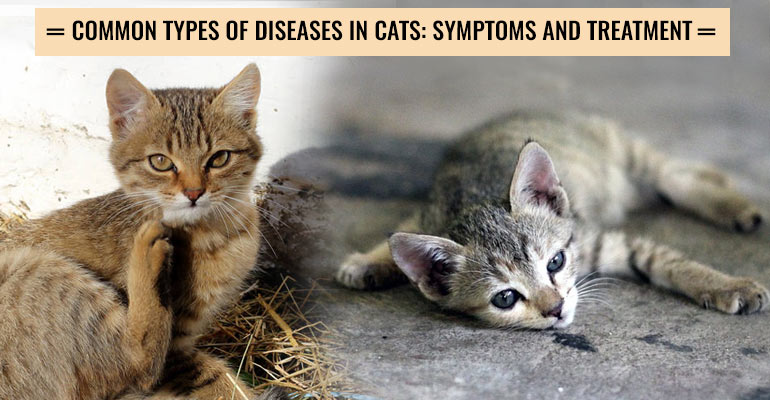Common Types of Diseases in Cats: Symptoms and Treatment
Pet parents will know that having a pet (cats, in this case) is not at all joyous as it seems, especially when their cute little munchkins fall sick. Cats are prone to loads of diseases and it is important to detect them early to avoid more headaches. Some of the more common Feline diseases, their symptoms and treatment methods are mentioned below.
Common Types of Feline Diseases
#1.Dental Issues
It is also known as gum disease, this is a very common issue in cats these days and generally occurs when plaque appears or develops on the surfaces of your feline’s teeth. Failing to clean the plaque at its initial stage will lead tartars, which is very difficult to get rid of Symptoms of such a disease include:
– Eating Difficulties
– Excessive Drooling
– Foul Breath
– Loose teeth
– Pawing At the Teeth and Mouth Areas
Treatment – A wide range of cat dental products are available such as Pet Dent Toothpaste/Oral Rinse/Gel.
#2.Diabetes
A highly common and complex disease in cats which occurs either by a shortage of hormone insulin or lack of response to insulin. This could lead to complicated health issues if left untreated. The following symptoms are related to diabetes.
– Dehydration
– Excessive Urination
– Increase in Thirst Levels
– Increase or Decrease in Appetite
– Lethargy
– Untidy Hair Coat
– Weight Loss
Treatment – Insulin injections, extreme intensive hospitalized care, and oral medications are ways to cure diabetes.
#3.Diarrhea
Loose, water-like stools or inconsistent bowel movements is known as Diarrhea and is a common issue among cats. There are numerous symptoms of such a problem and includes the following:
– Appetite Loss
– Continuous Bowel Movements
– Dehydration
– Excessive Thirst
– Lethargy
– Reduction in Weight
Treatment – Depending on your pal’s condition treatment is decided. Treatment methods can include a change in diet, antibiotics, chemotherapy, homeopathic products, etc.
#4.Feline Immunodeficiency Virus (FIV)
This kind of disease occurs when a virus enters the body and slowly weakens the immune system. Due to such slowness, symptoms may not develop until years later. The symptoms of FIV are:
– Anemia
– Changes in Behavior
– Dental Problems
– Diarrhea
– Discharge from Nose and Eyes
– Excessive Urination
– Fever
– Gums and Mouth Inflammation
– Skin Issues
– Sneezing
– Weight Loss
Treatment – Proper diet, anti-inflammatory tablets, oral medication are some ways to treat such a type of problem.
#5.Fleas
Undoubtedly one of the most common issues in cats is fleas. These sleazy creatures can cause havoc and can be a nuisance, if not treated quickly. Symptoms include –
– Biting Fur
– Black pepper-like spots on the body
– Dull Fur Coat
– Excessive Scratching
– Hair Loss
– Licking
– Vomiting
– Weight Loss
Treatment – There are several treatment options such as flea powders, sprays,flea collars, oral medications, spot-on, and injections
Delve into Details : 3 Health Consequences of Flea and Tick Infections in Cats
#6.Urinary Tract Diseases
This disease occurs in the bladder and urethra and leads to difficulty in urinating and affects mainly older cats. Urinary Tract disease can lead to serious problems if not treated at its earliest. The symptoms of such an issue can include:
– Blood in Urine
– Constant Efforts to Urinate
– Problems in Urinating
– Urinating in Inappropriate Locations
Treatment – Drinking plenty of water is essential for your kitty. Apart from that, oral treatments, surgeries, etc, are an option.
#7.Worms
Besides fleas, worms are another very common issue affecting millions of cats worldwide. These worms breed in the cat’s body and cause discomforts. They need to be eliminated as fast as possible to avoid major problems. Symptoms of worms include:
– Bloated Stomach
– Constipation
– Continuous Coughing
– Diarrhea
– Dull Fur
– Bloody Stool
– Unusual Behavior
– Vomiting
– Worms in Feces
Treatment – Worms can be cured by using de-wormers. Not all de-wormers are effective on a particular type of worm. Hence, first know what type of worm has affected your pal and then opt for a de-wormer.
Some symptoms may not tell you the actual story and hence, as soon as any symptoms develop, make sure to consult a vet as quickly as possible.




